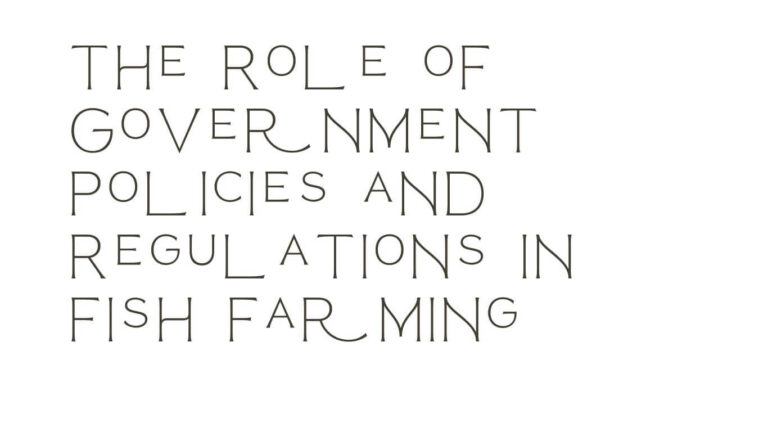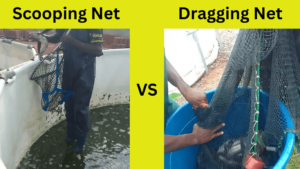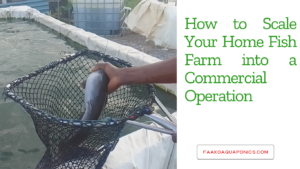The role of government policies and regulations is very crucial in fish farming activities. This is because, despite the numerous benefits of fish farming, it also poses a threat to the environment, food security, and social responsibility.
Therefore government policies and regulations will regulate the behavior and activities of fish farmers to ensure environmental and social friendly practices.
Fish farming, as part of aquaculture, is a rapidly growing industry that provides a significant source of protein for millions of people around the world.
However, the growth of the industry also. In this blog post, we will explore the role of government policies and regulations in fish farming and their impact on the industry.
Regulatory Framework
Government policies and regulations provide a framework for the fish farming industry to operate within. These regulations cover a range of areas, including:
Environmental impact
Government policies and regulations aim to minimize the environmental impact of fish farming. The environment is hugely affected by the activities of irrational practices of fish farmers. Such include land degradation. When fish ponds, especially earthen ponds are constructed along water rays, sometimes it causes soil erosion.
The release of fish waste, either solid or liquid waste affects the environment.
Fish farmers also release chemicals into the fish ponds which are sometimes washed into the water bodies in the process of treating the fish. This could be anti-biotics.
All these activities affect the environment and there is a need for Government policies and regulations to govern those activities.
Food safety
Regulations ensure that farmed fish are safe for human consumption, with guidelines for feed, water quality, and disease management.
Government policies and regulations would also ensure free food fraud. Food fraud is where there is deception in the packaging, labeling, and distribution of food either to make more profit or for other reasons. So the role of government policies and regulations is to ensure that people buy and confirm the right fish as communicated.
For example, some fish farmers may label their fish products are organic when in actual fact is not organic. So people may buy such fish with the aim of consuming organic food. This can affect the health of people therefore government policies and regulations must be up to task.
Animal welfare
Regulations promote the humane treatment of farmed fish, with guidelines for stocking densities, water quality, and handling practices.
Sometimes how fish farmers treat fish is very petetic. Fish farmers overstock their fish making them crowd, compete for resources, and suffer in the fish ponds.
Fish are also going through a lot of stress during transportation, sorting, and other practices. All these activities are inhumane treatment of stocked fish. The role of government policies and regulations is to ensure that such practices are in order and friendly to the aquatic creatures.
Trade and commerce
Regulations govern the trade of farmed fish, including labeling, marketing, and export requirements. As I mentioned earlier, branding, labeling, and marketing of fish products should be strictly monitored since farmers and other retailers deceive people.
They put wrong information on their fish just to make sell which might not be necessarily true. So, the role of government policies and regulations will ensure that fish marketers will adhere to the right principles laid down. This will ensure good marketing and trade strategies.
Benefits of Regulations
The role of government policies and regulations is to provide several benefits to the fish farming industry, including:
- Environmental sustainability
Regulations help minimize the environmental impact of fish farming, ensuring that the industry is sustainable for future generations.
Policies and regulations should be formulated relating to the environment for all fish farmers to follow. When fish farmers fail to follow them, the role of government is to ensure that those farmers are brought to book.
- Food safety and quality
Regulations ensure that farmed fish are safe and healthy for human consumption, maintaining consumer confidence in the industry.
Sometimes even the preservation procedures of fish are dangerous for consumers. The role of government policies and regulations will ensure that fish produced would be free from chemicals and other harmful practices to ensure human safety in the consumption of the fish.
- Animal welfare
Regulations promote the humane treatment of farmed fish, improving their welfare and reducing stress.
Fish, just like humans, also have lives and blood run in them. What you do also affect them. For example, when you do something in your fish pond that is not pleasant to the fish, all of them will run to the other side. All these are indications that the fish also have feelings and must be respected. The role of government policies and regulations is to provide the rights of the fish and to enforce them.
- Level playing field
Regulations create a level playing field for fish farmers, ensuring that all operators comply with the same standards.
It’s very common to even go to a country or region to find that fish operations are in different ways. Despite the modern methods of fish farming such as Recirculating Aquaculture System (RAS), automated feeders, and others, some fish farmers still stick to traditional methods.
The role of government policies and regulations is to ensure there is a uniform and the same level of aquaculture practices across geographical locations.
Challenges and Limitations
While government policies and regulations play a crucial role in fish farming, there are also challenges and limitations to consider:
- Enforcement
Regulations are only effective if they are enforced, and enforcement can be challenging, especially in remote areas.
Most countries have set rules, policies, and regulations but they are mostly not adhered to. So law enforcement agencies must also ensure that fish farmers or aquapreneurs follow those rules.
- Cost
Compliance with regulations can be costly for fish farmers, particularly small-scale operators. This cost is for both sides. Sometimes the practices of modern fish farming methods are costly. The use of the Recirculating Aquaculture System (RAS) and automated feeders is environmentally friendly but also costly for fish farmers, especially for beginners.
Also, ensuring strict monitoring and adherence to the policies by the government is costly, making it difficult for implementation. All these weaken the role of government policies and regulations in fish farming.
- Bureaucracy
Regulations can create bureaucratic hurdles, delaying the permitting process and hindering industry growth.
To acquire just even operation permits in some countries, fish farmers have to go through stressful procedures. From office to office with the same story go and come every day. This stress finally will drive farmers away and they either go and start without the permit or stop the agenda at all.
So the role of government policies and regulations should also ensure that officers in charge also do their work very well and reduce the bureaucratic manner of the process.
- Lack of resources
In some countries, a lack of resources and infrastructure can limit the effectiveness of regulations. Monitoring and implementation all come at a cost. Set up the regulations, to enforce them are all costs. Some governments might not be able to afford that.
Even fish farmers also, lack resources is makes it difficult for farmers to follow rules and regulations.
The role of government policies and regulations should ensure resource availability in the sector.
Best Practices
To maximize the effectiveness of government policies and regulations, the following best practices can be adopted:
i. Collaboration
Encourage collaboration between government agencies, fish farmers, and other stakeholders to develop and implement regulations. There should also be collaboration between and among fish farmers themselves.
ii. Science-based approach
Base regulations on scientific research and data to ensure they are effective and practical.
The government must ensure scientists continue to do research in the field and constantly update the practices of fish farming.
iii. Flexibility
Allow for flexibility in regulations to accommodate different farming systems and species.
Sometimes the role of government policies and regulations is to ensure flexibility in fish farming operations, especially in adhering to the regulations.
iv. Education and training
Provide education and training for fish farmers to ensure they understand and comply with regulations.
To be successful as a fish farmer, continuing learning is very Important. You need as a fish farmer to always increase your knowledge and skills in the sector.
The government must also ensure continued training of fish farmers in the sectors. Particularly on the importance of following government policies and regulations.
Conclusion
The role of government policies and regulations is to ensure that fish farming is done in a responsible and sustainable manner.
While there are challenges and limitations to consider, the benefits of regulations far outweigh the costs.
By adopting best practices and collaborating with stakeholders, governments can create an effective regulatory framework that promotes environmental sustainability, food safety, and animal welfare in the fish farming industry.
As the demand for seafood continues to grow, it is essential that government policies and regulations evolve to meet the changing needs of the industry and ensure a sustainable future for fish farming.




This is a topic which is close to my heart… Best wishes! Exactly where can I find the contact details for questions?
Great information. Lucky me I found your website by accident (stumbleupon). I’ve saved as a favorite for later.
Greetings! Very useful advice in this particular article! It is the little changes that will make the most significant changes. Thanks for sharing!
This page really has all of the info I wanted about this subject and didn’t know who to ask.
I need to to thank you for this excellent read!! I certainly enjoyed every bit of it. I’ve got you bookmarked to look at new things you post…
Very good article. I am dealing with some of these issues as well..
Good article. I’m dealing with some of these issues as well..
Way cool! Some very valid points! I appreciate you writing this write-up plus the rest of the site is very good.
Greetings! Very useful advice in this particular article! It’s the little changes that produce the most important changes. Thanks a lot for sharing!
Наиболее трендовые события мировых подиумов.
Исчерпывающие эвенты лучших подуимов.
Модные дома, торговые марки, гедонизм.
Новое место для трендовых хайпбистов.
https://mvmedia.ru/novosti/282-vybiraem-puhovik-herno-podrobnyy-gayd/
You ought to take part in a contest for one of the most useful websites on the internet. I will highly recommend this web site!
Spot on with this write-up, I really think this web site needs a lot more attention. I’ll probably be returning to read through more, thanks for the info.
I like this weblog it’s a master piece! Glad I found this on google.!
hello there and thank you for your info – I have certainly
picked up anything new from right here. I did however expertise a few technical issues using this site, as I experienced
to reload the website lots of times previous to I could get it to load correctly.
I had been wondering if your web hosting is OK?
Not that I’m complaining, but slow loading instances times will very
frequently affect your placement in google and could damage your
high-quality score if advertising and marketing with Adwords.
Well I am adding this RSS to my e-mail and can look out for much more of your respective interesting
content. Make sure you update this again very soon..
Lista escape room